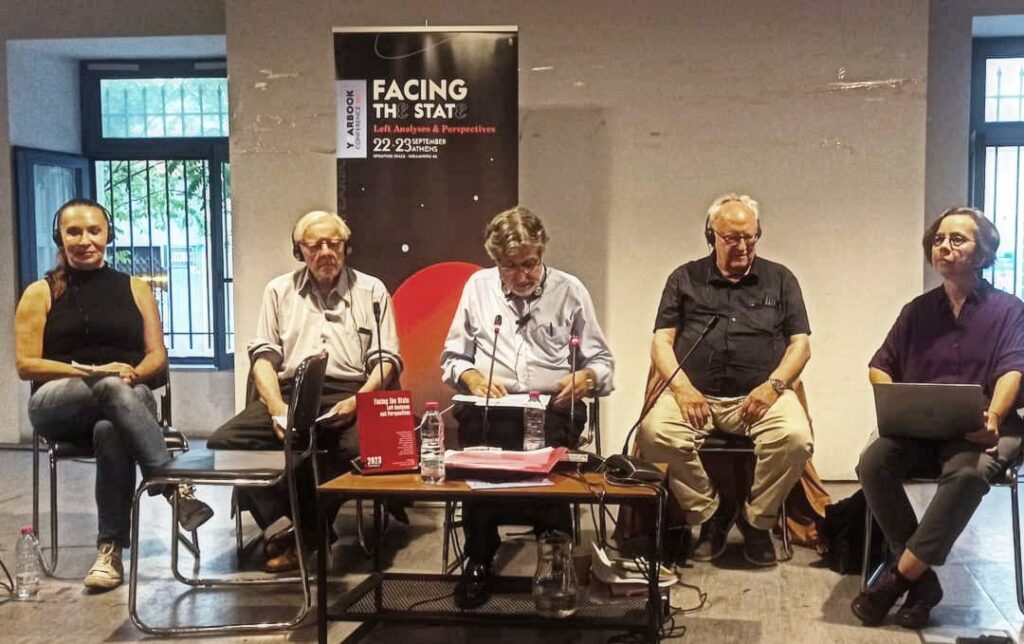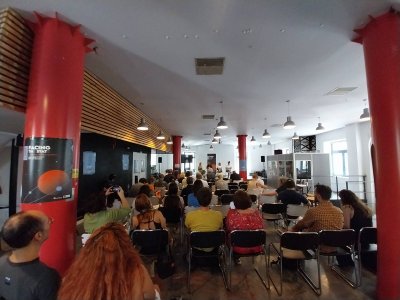Over the years the Left has faced the state in various theoretical ways that have produced different political approaches.
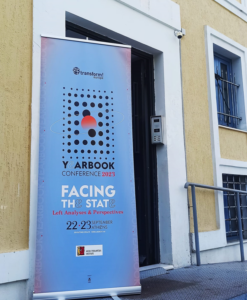 On September 22 and 23, the network of European political institutes transform! europe, in cooperation with the Nikos Poulantzas Institute, organised an international conference entitled: Facing the State: Left Analyses and Perspectives. At the Sputnik Multipurpose Hall in Athens, about twenty-five speakers from all over Europe and Latin America participated in discussions on the relationship between the Left and the state from various perspectives — analysis and theory, strategy and practice. As one purpose of the conference was to promote the latest issue of the yearbook of transform! europe (“transform Yearbook”), many of the speakers were the authors of the different chapters of the yearbook. The six round tables included both distinguished and younger academics, as well as politicians who participated in left and progressive governments. The conference was held in Greek and English, with simultaneous interpretation of the speakers and the audience.
On September 22 and 23, the network of European political institutes transform! europe, in cooperation with the Nikos Poulantzas Institute, organised an international conference entitled: Facing the State: Left Analyses and Perspectives. At the Sputnik Multipurpose Hall in Athens, about twenty-five speakers from all over Europe and Latin America participated in discussions on the relationship between the Left and the state from various perspectives — analysis and theory, strategy and practice. As one purpose of the conference was to promote the latest issue of the yearbook of transform! europe (“transform Yearbook”), many of the speakers were the authors of the different chapters of the yearbook. The six round tables included both distinguished and younger academics, as well as politicians who participated in left and progressive governments. The conference was held in Greek and English, with simultaneous interpretation of the speakers and the audience.
Over the years, the Left has faced the state in various ways and has developed theoretical and political tools for analysing and understanding this confrontation, leading to different political approaches. However, the present conditions require new ideas and tools; facing the state nowadays means asking new questions about its form, its role and its relationship with the Left. The topics discussed in the conference gave space to various contributions, ranging from the recent development of Marxist theories of the state to the different state responses to the climate crisis, and from numerous feminist perspectives on the state to the experiences by left parties in government and issues as pressing as the commons and migration policies.
The first round table on the social and environmental challenges of the state, moderated by transform!europe co-chair Cornelia Hildebrandt, was a conversation between Hilary Wainwright, co-editor of Red Pepper magazine, Julia Russo, PhD candidate in Political Science and Sociology, Franz Segbers, Professor Emeritus of Social Ethics, and Hanz Thie, author and former economic and energy policy adviser of the Left Party (Die Linke) in Germany. The discussion focused on the new necessities for the state that arise from the climate crisis, and on the necessary change of the production model in Europe, a change that can be implemented only by the state, in terms of social justice and long-term sustainability, precisely because it requires, first and foremost, a political decision that will challenge the modern overproduction and overconsumption based on fossil fuels. A political strategy aiming to redirect production to socially useful purposes (particularly to a radical reduction of carbon emissions) should transform the state so that it becomes the vehicle that will lead to decarbonising production. As Urlich Brandt 1 argues in his article in the Yearbook, a transformed state providing structure, personnel, and policies, is essential if we want to achieve the goals of a strong social movement: the change of social power relations and social-ecological transformations.
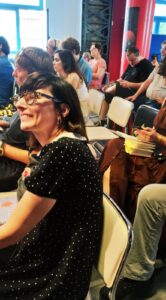 The second session opened a discussion about the state and forms of authoritarianism. The speakers were: Sofia Vidali, Professor of Criminology, Katerina Papanikolaou, PhD in Public Law and member of the Greek Authority for the Security of Communications and Privacy Protection, Gavin Rae, Associate Professor of Sociology in Poland, and Steven Forti, historian, from the Autonomous University of Barcelona. Moderated by Danae Koltsida, director of the Nikos Poulantzas Institute, the session began with an overview of authoritarian governments led by far-right parties and authoritarian political leaders, of their global connections and of the similarity of their ideological and economic programs, which constitute the most acute form of modern neoliberalism, despite the efforts of far-right parties that are not in government positions to present themselves as defenders of the welfare state and people’s needs (see the far right in France) or as being moderate on individual rights issues (such as abortion rights in the case of Nordic far-right parties).
The second session opened a discussion about the state and forms of authoritarianism. The speakers were: Sofia Vidali, Professor of Criminology, Katerina Papanikolaou, PhD in Public Law and member of the Greek Authority for the Security of Communications and Privacy Protection, Gavin Rae, Associate Professor of Sociology in Poland, and Steven Forti, historian, from the Autonomous University of Barcelona. Moderated by Danae Koltsida, director of the Nikos Poulantzas Institute, the session began with an overview of authoritarian governments led by far-right parties and authoritarian political leaders, of their global connections and of the similarity of their ideological and economic programs, which constitute the most acute form of modern neoliberalism, despite the efforts of far-right parties that are not in government positions to present themselves as defenders of the welfare state and people’s needs (see the far right in France) or as being moderate on individual rights issues (such as abortion rights in the case of Nordic far-right parties).
The next topic, related to the previous one, was the nature and role of the repressive mechanisms of the state; the panel linked the hegemonic narrative on security and insecurity, inter alia, with the reproduction of discourses about crime and criminality, or the perception of whether or not we need stricter penalties, underlining the need to understand the chain of oppressive mechanisms of social control (police, justice, prison system) as a unity that operates and reproduces exactly under the same inseparable logic, in a way that it is impossible for a reform of the judiciary to entail a harmonised change in the prison system, etc. Τhe intervention referring to the case of wiretapping in Greece, through illegal Predator software, was of particular interest, describing the new reality that has been formed, where it is no longer only the state that threatens individual rights and freedoms, but also a number of other private legal entities. At the same time, the intervention described in detail all the institutional tools available to society in order to defend itself against the questioning or violation of its individual rights and freedoms, both at national and supranational level, and concluded with an open reflection on the nature and role of independent authorities, as well as on the form of a progressive and democratic response to them.
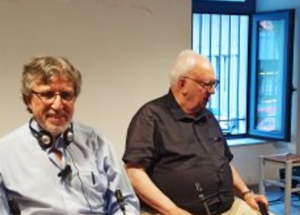 The first day of the conference ended with the long-awaited discussion on Marxist theories of the state, with the participation of the much-loved leftist intellectual Etienne Balibar, the internationally renowned sociologist Goran Therborn, the professor of Social Anthropology Athena Athanasiou and Dunja Larise, coordinator of the project: “Austro-Marxism” (which is carried out with the support of transform!europe, the Rosa Luxemburg Foundation and the City of Vienna), who emotionally thanked the members of the organisation for giving her the opportunity to attend the same table with people she considered her teachers. The contributions included an overview of the theoretical elaborations of marxist and neo-marxist thought on the state and their connection to contemporary questions, with the aim of rewriting Marxist theory of the state so as to include the possibilities of transforming it today. The enrichment of the Poulantzian interpretation of the state with new variables and mediations contributes both to the revival of left theory and to the political-strategic arsenal of the political Left in its daily battles against the state. It is no more just the category of social class that is inscribed, through social relations, within the state and condensed into it, but also the categories of gender, race, exclusion or privilege arising on the basis of able-bodiedness, etc.
The first day of the conference ended with the long-awaited discussion on Marxist theories of the state, with the participation of the much-loved leftist intellectual Etienne Balibar, the internationally renowned sociologist Goran Therborn, the professor of Social Anthropology Athena Athanasiou and Dunja Larise, coordinator of the project: “Austro-Marxism” (which is carried out with the support of transform!europe, the Rosa Luxemburg Foundation and the City of Vienna), who emotionally thanked the members of the organisation for giving her the opportunity to attend the same table with people she considered her teachers. The contributions included an overview of the theoretical elaborations of marxist and neo-marxist thought on the state and their connection to contemporary questions, with the aim of rewriting Marxist theory of the state so as to include the possibilities of transforming it today. The enrichment of the Poulantzian interpretation of the state with new variables and mediations contributes both to the revival of left theory and to the political-strategic arsenal of the political Left in its daily battles against the state. It is no more just the category of social class that is inscribed, through social relations, within the state and condensed into it, but also the categories of gender, race, exclusion or privilege arising on the basis of able-bodiedness, etc.
Intersectionality reinvigorates analyses of the state and, consequently, political struggles for it. Goran Therborn2 is clear when he argues that the modern state cannot be understood only as a capitalist state. States are also parts of a historically advanced geopolitical system of states and have their roots in national history and culture. States are, or should be, regarded as (a) the material condensation of the relationship between social forces within a given territory, i.e. the condensation of class forces and the forces of class factions, but also the condensation of territorial culture and history with their forces and movements (e.g., secular or religious, feminist or patriarchal) and b) the material refractions of their positions and history in the relevant geopolitical system of states.
During the second day of the conference there were three round tables, with the first hosting a highly interactive and all-women discussion presenting diverse feminist perspectives of the state. Aggeliki Drogiti, postdoctoral researcher in Sociology, Karina Batthyany from Argentina, managing secretary at CLACSO (Latin American Council of Social Sciences), and Ankica Čakardic, associate professor at the University of Zagreb, under the coordination and guidance of Aliki Kosyfologou, PhD in Political Science, developed some of the most acute issues concerning the meeting of feminism with marxism, as well as the feminist readings of state reproduction. The theories of social reproduction and the overview of their three historical currents, the feminist critique of the military and its contribution to the construction and consolidation of national and patriarchal narratives, as well as the transformation of the state from a patriarchal and oppressive entity to an inclusive and protective state for everyone, were the main pillars of the discussion, which was enriched by many and varied questions from the audience, expanding the boundaries of reflections and paving the way to more honest confrontations and criticism.
 The participation of political figures in the conference took place in a round table aiming to exchange experiences between left-wing parties that have governed or have been (as junior partners) in coalition governments. The debate was attended by Kristina Lustenberg, Member of Parliament for Montevideo in the Uruguayan Parliament, Hannah Sarkkinen, Member of the Finnish Parliament and former Minister of Social Affairs and Health, Euclid Tsakalotos, SYRIZA MP and former Finance Minister, and Marga Ferré, co-president of transform!europe and member of Spain’s United Left. The moderator, Haris Golemis, editor-in-chief of the transform!europe Yearbook, introduced us to the genealogy of the controversy over the participation of the Left in government. The question of the state has occupied the political forces of the Left since the emergence of the socialist and communist movements and the question of government, which is one of the institutions of the state, also responsible for its management, is of major importance and a field of intense debate. The conquest of government power, especially when it comes to the question of whether or not parties of the radical Left should participate in multi-party governments as minor partners, has historically caused great frictions, but also rifts and splits in these parties. The argument of those who hold the view that parties of the radical Left should take government responsibilities is that this increases their ability to exert pressure aiming to implement policies in various areas for the benefit of the classes or social strata they want to represent.
The participation of political figures in the conference took place in a round table aiming to exchange experiences between left-wing parties that have governed or have been (as junior partners) in coalition governments. The debate was attended by Kristina Lustenberg, Member of Parliament for Montevideo in the Uruguayan Parliament, Hannah Sarkkinen, Member of the Finnish Parliament and former Minister of Social Affairs and Health, Euclid Tsakalotos, SYRIZA MP and former Finance Minister, and Marga Ferré, co-president of transform!europe and member of Spain’s United Left. The moderator, Haris Golemis, editor-in-chief of the transform!europe Yearbook, introduced us to the genealogy of the controversy over the participation of the Left in government. The question of the state has occupied the political forces of the Left since the emergence of the socialist and communist movements and the question of government, which is one of the institutions of the state, also responsible for its management, is of major importance and a field of intense debate. The conquest of government power, especially when it comes to the question of whether or not parties of the radical Left should participate in multi-party governments as minor partners, has historically caused great frictions, but also rifts and splits in these parties. The argument of those who hold the view that parties of the radical Left should take government responsibilities is that this increases their ability to exert pressure aiming to implement policies in various areas for the benefit of the classes or social strata they want to represent.
The speakers presented the problems that occurred in the relations between parties that have exerted governmental power and the state institutions (the bureaucracy of the public administration, i.e. civil servants in ministries, police, army, judiciary, parliament, or the head of the state), but also between them and the “ideological mechanisms of the state”, such as the Church and the media. The debate also highlighted the feasibility or impossibility of introducing structural changes (as described by the eurocommunist tradition) by a government of the Left or by the participation of left-wing parties in a coalition government. Structural changes are defined as reforms that have a more permanent and hard-to-reverse character, so that the governments of the Left are not just parentheses in transforming the state but can secure gains for the strata they represent.
The conference ended with a discussion on the position of nation states in the case of a collapse of the international order, with the participation of Volodymyr Ishchenko, Research Associate at the Institute of East European Studies at the Free University of Berlin, Hilary Wainwright and Antonis Tzanakopoulos, Professor of Public International Law at Oxford. Moderated by Walter Baier, President of the Party of the European Left, the discussion was about the nature and the structural limitations of International Law, the role played within it by the power of each particular state and the way this is crystallised in it, as well as the recognition of the margins we have in each different sphere of political intervention and action, so that we do not get caught up in erratic battles, but, on the contrary, open up new spaces for collective political action from below.
War in this day and age has been, of course, a topic of this session, with Russia’s invasion of Ukraine and the war that has, until now, lasted a year and a half, being the springboard to discuss the — as they are usually called — geopolitical upheavals, as well as the return of the narrative of the powerful nation-state. The discussion ended by leaving widespread concerns about the inability to build a massive and dynamic peace movement, linked to the workers’ movements, the struggles of women and the LGBTQI+ community and the ecological demands of the 21st century, the way it was in its heyday and influence.
Angelina Giannopoulou is a political scientist, member of the organising committee of the conference “Facing the State; Left Analyses and Perspectives”. The report was first published in Greek in Η Αυγή (“The Dawn”), a daily newspaper published in Athens.
Read the presentation and summary of the 2023 yearbook Facing the State: Left Analyses and Perspectives.
As long as it concerns those who could not attend the conference, we can only encourage them to buy the new yearbook of transform!europe (available in English) by ordering it at: www.merlinpress.co.uk/
Footnotes:
1. Ulrich Brand, «The Role of the State in Social-Ecological Transformations: Some Theoretical Considerations and Current Observations», in: David Broder, Eric Canepa, Haris Golemis (eds.) Facing the State. Left Analyses and Perspectives, London, Merlin Press, 2023, p. 116.
2. Goran Therborn, «The Capitalist State and the Looming Endgame of Western World Domination. Interviewed by Haris Golemis», in: David Broder, Eric Canepa, Haris Golemis (eds.) Facing the State. Left Analyses and Perspectives, London, Merlin Press, 2023, p. 167.
